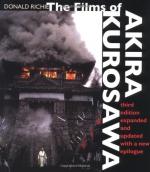|
This section contains 3,557 words (approx. 12 pages at 300 words per page) |

|
SOURCE: "From the Baroque to Wabi: Translating Animal Imagery from Shakespeare's King Lear to Kurosawa's Ran," in Literature/Film Quarterly, Vol. 25, No. 2, 1997, pp. 146-51.
[In the following essay, Kane follows the translation of animal imagery from King Lear to Ran, as it is affected by the Japanese concept of minimalism.]
One comes away from viewing Akira Kurosawa's Ran, a cinematic adaptation of Shakespeare's King Lear set in sixteenth-century Japan, with the distinct impression that Shakespeare's poetry has been jettisoned in favor of visual imagery. Screenwriters Kurosawa, Hideo Oguni, and Ide Masato have seemingly pared dialogue to the minimum necessary to advance the plot. Where Shakespeare's King Lear takes sixty-nine lines of gorgeous blank verse to divide up his kingdom, for example, Kurosawa's Hidetora spends only a few staccato sentences. The viewer's impression of linguistic minimalism in Ran is borne up by former visual artist Kurosawa's reputation for distrusting...
|
This section contains 3,557 words (approx. 12 pages at 300 words per page) |

|


